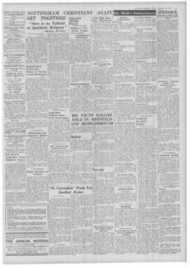Page 4, 18th September 1942
Page 4

Report an error
Noticed an error on this page?If you've noticed an error in this article please click here to report it.
Tags
Share
Related articles
Points From Letters
"this Is A Pretty Cynical Assembly"
Workers Of T E Orld Split!
Conversion Of England
Education Debate
TOWARDS A THIRD IDEOLOGY
By STANLEY B. JAMES
SAID Mr. F. WoIstencroft, President of the Trade Union Congress, addressing Mr. Churchill: "I thank God that in the hour of our need the nation found a man with courage and faith in our people to see it through. Opposed to you in politics I nevertheless express to you the gratitude of the working people for the magnificent example you have set of sgrim resolution and unflinching devotion to any." That tribute from a Labour leader to the Leader of the Conservative Party can be matched by equally glowing tributes ,from the other side to the loyalty and strenuous co-operation of the workers. Behind the scenes, a work of social fusion is going on. It has taken a war on an unparalleled scale to begin to break down the barriers, but they can be broken down. From the clash of ideologies there may yet issue a third ideology under which men will find themselves uniting. even against the demands of their leaders. But for this to happen it is imperative that the instinctive rapprochement of man to man, within the nation and outside it, shall common p common p be cemented by a clearly conceived courpose of the highest order. It is on that work that the leadership of Christianity should be concentrated.
BOURGEOISIE AND PROLETARIAT IWO great world-forces that threatened to dis rupt Western society have met in an alliance sealed with the blood of both. Mr. Churchill representing "bourgeois" Britain and an envoy from Washington representing " plutocratic " America have visited and been entertained by Stalin in Moscow. The drawing together of these two forces, therefore. is no insular affair, but affects the United Nations as a whole. Think for a moment of the ink that has been spilt in this classwar—the newspaper articles, pamphlets, propagandist plays and novels, and the tendentious books that have been written on one side and the other. Add to this the organisations formed to carry on the class-war, and the countless speeches for and against delivered. and some notion may be formed as to the character of the thing that war has made possible. Need it remain purely superficial?
We have had much to say in the past as to the
dangers involved in the Russian alliance. We were not alone in that. Apprehension as to the effects of close association with the Soviet Republic is no mere Catholic fad. The Trade Union Congess has recently put on record a similar apprehension. In the United States, where a large body of workers still refuses to join with Russian trade unionists. the feeling is even stronger. We recall nothing that we have said on this point. But it is well to bear in mind that Russia has a negative contribution to make to a common social ideal. Communism (like Nazism) has effectively challenged the rule of privileged and financial classes. Along with the dangers there are immense possibilities for good in this alliance. We may not accept the Communist or Nazist remedy for the evils of capitalist societies, hut we must be thankful that those evils have been exposed.
A REPRESENTATIVE MAN WE are fortunate in having at the present time the leadership of a man whose passionate patriotism has enabled him to transcend class differences. Victor Gollancz speaks with truth when, in Russia and Ourselves, he says: " For Communists, during the period from September, 1939, to June, 1941, Churchill was the representative of ' capitalism.' But even within the confines of the class struggle theory, the essential fact was that Churchill was the representative, not of international monopoly capitalism, but of patriotic national capitalism: and in the real world the essential fact (for immediate purposes) was, not that Churchill was a representative of capitalism at all, but that he was a patriot, a hater of what he rightly calls HitIer's • wickedness,' and a man with a sense of European culture and European values."
We might go further than that. The American strain in his blood, which spoke so eloquently. when. a little while ago, he addressed audiences in Canada and the United States, extends his representative character beyond Europe. His friendship with the statesmen responsible for the New Deal, embodying the principle of social responsibility, exceeds what is required by diplomatic courteous ness and is based upon a real similarity of outlook. And on the part of both there is an approximation to the Soviet Russian ideology in which " work for the community takes pride of place." There is here a conjunction which makes it possible to hope that, in the future, Anglo-Ameri can civilisation will translate into social terms the symbol presented by the unarmed frontier between Canada and the United States. and that a society will be created in which the bristling class frontiers that have divided noble and plebian, rich and poor,
will have been rendered as innocuous as that which divides North America. The personality of Mr. Churchill symbolises a reconciliation of forces under the emotionalism of war conditions which, by being cultivated, may give us grounds for hope.
CLEAVAGE IN THE LEFT 'A NOTHER factor pointing to the emergence be' hind the class frontiers of a changed attitude is suggested by the attitude of certain leaders of the Left. Not to take note of this and, in consequence, to lump.all designated by that term as materialistic and amoral would be a disastrous mistake. This new attitude suggests the possibility of a much closer understanding between a section of the Left and ourselves than, a little while ago, would have been thought possible. Such an understanding is, indeed, suggested in a little book. issued by the Rationalist Press, entitled World Revolution. Speaking of co-operation, the author, Dr. W. Friedmann, says: " The common background lies in the crisis which has revealed a deep cleavage between technical achievement and moral insufficiency, and has produced a spiritual revolt apinst the threatened abyss of nihilism and destruction, a greater diffidence and modesty regarding the progress of mankind, and a reaction from a predominantly economically inspired ideology towards a new one, the outline of which is not yet very clear. All this translates itself into an urge to make freedom, social justice. and international harmony more of a reality, though the object for one may be to follow the example of Christ and for the other to apply the faculties of reason to promote the happiness of mankind in this world." Even more significant are the indications given by Mr. Victor Gollanez, originator of the Left Book Club, in his Russia and Ourselves, that in seeking to discover how to " recreate the spirit of Socialism," he relies on the help of the Christian tradition. In the chapter devoted to this subject there are several passages which it is tempting to quote, but we can find room here for only one sentence: " For non-Christians to reject Christians as allies, merely because Christians find their sanction for morality in God's existence and nature, and non-Christians do not, is to the last degree frivolous; and the same applies vireversa." The case of Dr. load, dealt with recently on this page, is another and even more striking instance of the same tendency. Studying such utterances, we become aware of spiritual and moral forces at work which may surely bring nearer the day when we shall see that functional society in which each gives according to his ability and receives according to his need and in which the class divisions of the past will be forgotten, A CHRISTIAN IDEOLOGY AS it will have been observed, Dr. Friedmann declared that there was a reaction from a predominantly economically inspired ideology towards a new one, the outline of which is not yet very clear." Mr. Gollancz hints at the same need when he writes: " The initial inspiration of the socialist movement in all countries and in all its phases was not a theory of human history, but a passionate and consuming faith. In the case of the British Labour Party, this faith was never seriously reinforced by a scientific theory: and the faith itself grew old and tired. The result is that in our own day the steam that drives the Labour Party is not of high pressure, nor is the rudder that steers it firm and sure. To recover the old faith in all its glory is the first necessity; but sound theory is no less important." That the humanitarian movement in Great Britain is in need of an ideological framework must be evident to all thoughtful observers. Because it has been lacking many have adopted, in complete inconsistency with their own-ethical motives, the Marxian philosophy. The Marxian theory is quite incompatible with the outlook characterising the majority of our countrymen, but it has been the only thing in sight, and they have therefore accepted the label of Marxian. What has called itself Christian Socialism on the other hand has failed to meet the need because the " Christianity " it professed has been largely of the undogmatic character. And those who did subscribe to the Catholic Creed have failed to show its social implications. At best, they have preached the Christian ethic. But the Christian ethic divorced front its theological basis is insufficient in the present situation. It was not remembrance of the Sermon on the Mount but the coming of the Holy Spirit and the light He threw on the Birth. Death and Resurrection of Our Lord which created that brotherhood, extending to the economic sphere, of which we read in the earlier chapters of the Acts. Let a Catholic theology be brought out of the library and the seminary and interpreted in close relation to the need which the abandonment of Marxian materialism has created and things will begin to move.
blog comments powered by Disqus







